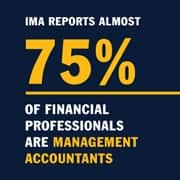What is Management Accounting?

Understanding the numbers
When reviewing job growth and salary information, it’s important to remember that actual numbers can vary due to many different factors—like years of experience in the role, industry of employment, geographic location, worker skill and economic conditions. Cited projections are based on Bureau of Labor Statistics data, not on SNHU graduate outcomes, and do not guarantee actual salary or job growth.

Accounting remains a crucial part of any successful business venture in fields ranging from education to healthcare, technology to hospitality and more.
"Accounting is the language of business," said Kristin Regis, senior associate dean of business at Southern New Hampshire University (SNHU). According to Regis, who holds an MBA from SNHU and a master's in financial planning, accountants identify, record and communicate business transactions and other relevant data — they convey important financial information.
Management accounting, she said, is a specialized type of accounting — a dialect within the language of business.
What's the Difference Between Financial Accounting and Management Accounting?
Financial accountants may come to mind when you think about accounting, but management accountants have different objectives.

"Management accounting is internal and forward-looking, while financial accounting tends to be external and focuses on recording past events," said Timothy Crawford, MBA, MAcc, ME, MA, CMA, EA, an adjunct accounting instructor at SNHU.
And Crawford, who also works as a senior financial analyst, certainly knows a thing or two about the types of accounting, having spent the past 25 years working in different areas within the field.
He noted that financial accountants prepare financial reports for external stakeholders, including investors, creditors and regulators. "(Financial accounting) follows generally accepted accounting principles and focuses on producing financial statements like income statements, balance sheets and cash flow statements," he said.
Management accountants, conversely, are unique in the world of accounting because they typically hold in-house positions. That means management accountants work for an organization, agency or business directly rather than working for an accounting firm that serves various external clients.
Management accounting, according to Crawford, is all about providing relevant information and analysis – both financial and non-financial — for an organization’s internal management to inform decision-making and planning.
They analyze and explain the "why" behind reporting the numbers.
What, Exactly, is the Main Job Role of Management Accounting?
Management accountants are strategic partners. They work to ensure future success by identifying ways to create value for their organization and its products or services.
"Organizations need management accounting to survive," said Crawford, who is a Certified Management Accountant (CMA). "It provides timely and relevant information to managers, enabling them to make informed decisions about resource allocation, pricing strategies and performance evaluation."
Management accountants use numbers, data and research to help leadership minimize risk and maximize profit on behalf of the business.
According to Crawford, it's important for management accountants to understand how to:
- Analyze and control costs
- Create budgets and financial forecasts
- Evaluate business performance
- Provide financial information and analysis
These skills contribute directly to organizational decision-making, and they can be developed within a management accounting degree program.
With a bachelor's degree in accounting with a concentration in management accounting, you could become better qualified for the following roles, according to Crawford:
- Cost accounting: Help to minimize business expenses through cost analysis and budgeting
- Financial analyst: Support strategic planning through the evaluation of data and trends
- General management: Understand the financial needs of an organization and its management
- Management accounting: Assist in decision-making by providing financial information and analysis
Where Do Management Accountants Work?
Even accounting firms hire management accountants for their internal needs, but that’s far from your only option when looking for a position as a management accountant. As a management accountant, you could work in the private or public sector — and in almost any industry.
Management accountants can be found in:
- Private Corporations – From mom-and-pop shops to multinational corporations, businesses and industries of all sizes need strategic partners capable of marrying financial know-how with business savvy. These individuals hold positions up and down the corporate ladder, including auditors, tax managers, controllers and chief financial officers.
- Government – Management accountants play a key role in improving the efficiency of federal, state and local governments and agencies. Their ability to evaluate performance, finances and compliance can help streamline the use and distribution of resources.
- Nonprofits – Not-for-profit organizations face special financial situations, including strict budgets, special tax designations and the need to fundraise. As a result, nonprofits can especially benefit from the knowledge, expertise and skills of an accounting professional with broader business or management competencies.
- Education – Within education, management accountants can work directly for schools or school districts as educators themselves, teaching the next generation of accountants. If you've considered a career in accounting education, know you'll likely need a graduate degree to teach at the college level, according to the U.S. Bureau of Labor Statistics (BLS).
Management accounting is everywhere. It might even be hard to think of a place of work that wouldn’t benefit from a management accountant’s expertise and skills.
How Can You Become a Management Accountant?
Although financial accounting can be a springboard to management accounting, education can also supplement a financial accounting background. A majority of employers require candidates for accountant or auditor positions to have a bachelor’s degree in accounting or a related field, according to BLS.
If you know you want to become a management accountant, you might search for a bachelor's degree program that offers it as a specialization. For instance, SNHU offers a bachelor's in accounting and finance with a concentration in management accounting. In a program like that, you can take courses that explore topics such as:
- Accounting information systems
- Controllership
- Financial statement analysis
- Data analytics
These topics supplement core accounting and finance courses as well as general education curriculum.
Adding a management accounting concentration to a broad degree program can help you become a more competitive job candidate. "Specializing allows students to delve deeply into a specific area, gaining comprehensive knowledge and expertise that can make them highly valuable in that specific area," Crawford said.
With the right combination of credentials and experience, you’ll be in a position to contribute positively to the strategic, tactical and operating decisions of your organization, whether you work in the for-profit, nonprofit or government sectors.
Find Your Program
Is CMA Certification Worth It?
Job candidates with professional designations, such as Certified Public Accountant (CPA) or Certified Management Accountant (CMA), have specialized employment prospects, according to the BLS, and those with a master’s degree in accounting may also have an advantage.
The CMA professional certification can give you a competitive edge because it signals your mastery of the critical accounting and finance management skills needed in today’s global business landscape. These skills include financial planning, analysis and professional ethics.
With the rising demand for accounting professionals, special credentials such as a management accounting certificate and CMA certification can help your resume stand out to supervisors and hiring managers.
According to the Institute of Management Accountants (IMA), there are a few requirements you'll need to meet if you want to qualify for the certification. They include:
- Relevant education, such as a bachelor's degree from an accredited college
- Passing a two-part exam
- Membership with the IMA
- Meet work experience requirements
If you're interested in pursuing CMA certification, Regis recommended visiting IMA online to learn more.
Should You Get a Graduate Certificate in Management Accounting?
If you have some business acumen coupled with a head for numbers, a graduate certificate in management accounting is a great option for expanding your career potential. While a specialized graduate certificate surpasses the academic qualifications needed to become a CMA, earning one can give you a unique advantage when it comes time to sit for the exam.
Whether you want to become certified or not, an advanced certificate can build on your expertise, strengthen and expand your skills and help you define and advance toward your personal and professional goals. In addition to mastering the latest accounting strategies, tactics and rules, those earning a graduate certificate in management accounting can develop and apply accounting practices based on broader business competencies in order to drive their organizations forward.
Asynchronous online options also help you simultaneously work toward the CMA certification's professional experience qualification. Plus, it means you don't have to interrupt your career to advance it.

According to Dr. Jennifer Teague, an executive director of business programs at SNHU, a graduate certificate can also keep you relevant.
"Employees are looking for more flexible educational pathways in the form of skill-based certificates that demonstrate current knowledge in the field and a clear connection to an industry certification," she said.
Teague, who has a bachelor's, master's and doctorate degree in business, has built her career in academia, either teaching business courses or holding leadership positions.
And you can always put applicable credits toward a full-fledged master's in accounting program if you decide you want to earn a graduate degree, too. Or, you can work toward both credentials at the same time. Pairing a graduate certificate with a master's in accounting allows you to advance both your specialized and broad accounting knowledge and the technical skills and regulations that can make you a competent accountant.
A master’s in accounting with a graduate certificate in management accounting prepares you to pursue advanced positions within many kinds of organizations. This is true whether you’re working for a company, the government or a nonprofit, locally, nationally or internationally.

What are the Advantages of Studying Management Accounting?
Stricter laws and regulations (notably in the financial sector) are expected to increase the demand for accounting services as organizations work to comply with applicable governing rules.
To navigate what BLS calls "a complex tax and regulatory environment," accounting roles and similar positions will grow by 6% between 2023 and 2033.* And according to IMA, 75% of financial professionals today are management accountants, working in roles such as:
- Accounting manager
- Controller
- Data analytics manager
- Financial analyst
- Staff accountant
- Strategic planning director

Some management accounting programs, including SNHU's graduate certificate, align with the topics explored in the CMA exam, meaning you can feel better prepared to take the two-part CMA exam once you've met all the requirements.
And if studying or working in the accounting field appeals to you, you probably know about the importance of a good return on investment. IMA reported CMA professionals earn 21% more than their non-certified peers.*
In general, the median salary for all accountants and auditors was $81,680 in 2024, according to BLS, which was already far more than the $49,500 median salary for all occupations.*
Whether you’re a new or seasoned accounting professional, specialized education in management accounting can help you make the most of growing employment opportunities.
A degree can change your life. Find the SNHU accounting program that can best help you meet your goals.
*Cited job growth projections may not reflect local and/or short-term economic or job conditions and do not guarantee actual job growth. Actual salaries and/or earning potential may be the result of a combination of factors including, but not limited to: years of experience, industry of employment, geographic location, and worker skill.
Rebecca LeBoeuf Blanchette '18 '22G is a writer at Southern New Hampshire University, where she fulfills her love of learning daily through conversations with professionals across a range of fields. She earned her Bachelor of Arts in Communication with a minor in Professional Writing at SNHU’s campus in Manchester, New Hampshire, and followed her love of storytelling into the online Master of Arts in English and Creative Writing at SNHU. Connect with her on LinkedIn.
Explore more content like this article

For Jazzmen Shipp, Earning a Degree Changed Everything

How Kellsie Goodhart-Jones Earned an MBA While Working for the US Air Force

What Jobs Can You Get with a Business Degree?
About Southern New Hampshire University

SNHU is a nonprofit, accredited university with a mission to make high-quality education more accessible and affordable for everyone.
Founded in 1932, and online since 1995, we’ve helped countless students reach their goals with flexible, career-focused programs. Our 300-acre campus in Manchester, NH is home to over 3,000 students, and we serve over 135,000 students online. Visit our about SNHU page to learn more about our mission, accreditations, leadership team, national recognitions and awards.


